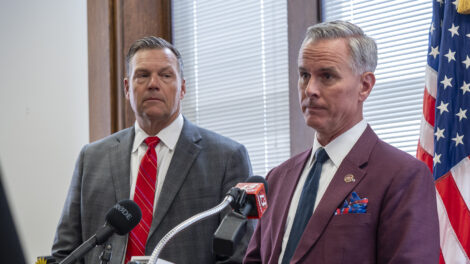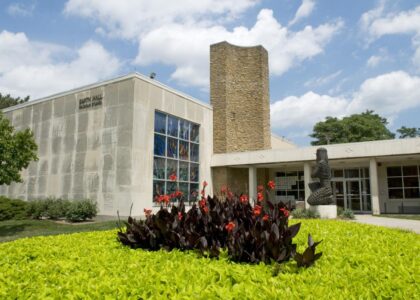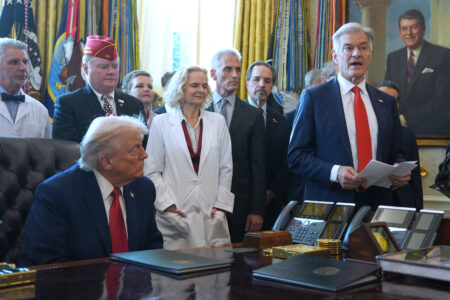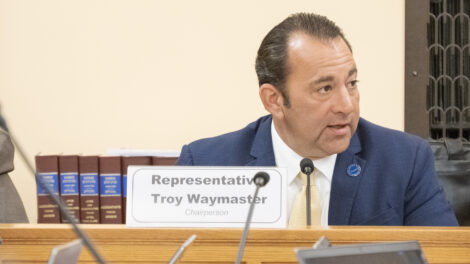Pay raise of at least 2.5% becomes more likely for KU employees now that state budget bill has been signed
Bill also creates task force to study 'right-sizing' and 'streamlining' higher ed'

photo by: Chad Lawhorn/Journal-World
University of Kansas Chancellor Douglas Girod and Kansas Gov. Laura Kelly were both on hand for an opening ceremony of KU Innovation Park's newest research and office building on Aug. 17, 2022.
Employees at the University of Kansas have faced a double dose of uncertainty about pay raises for the next year — uncertainty about state funding and worries about how federal cutbacks might hamper pay plans.
Now, it is looking more likely that most employees will get at least a 2.5% pay increase, KU Chancellor Douglas Girod recently told the Journal-World.
Gov. Laura Kelly on Wednesday signed the state budget bill that came out of the Kansas Legislature. That bill includes funding for a 2.5% pay increase for most state employees. With that news, Girod is feeling optimistic about having the funding to cover pay raises for all university employees, even those that aren’t covered by the state’s general fund pay plan.
“We anticipate doing raises,” Girod said on Friday before the governor had signed the budget bill. “I don’t know what level they are going to be. I hope they will be at least that,” Girod said of the 2.5% pay increase that is included in the state budget.
Questions about raises took on a new element last month when Girod sent out a message to all university employees notifying them that KU was modifying its hiring practices as the federal government considers new policies that could limit or restrict the amount of money KU receives from federal sources.
In that March 25 announcement, Girod said KU was creating a new high-level review process related to hirings, promotions and pay raises, among other items. KU stopped short of declaring a full hiring freeze, which several other universities have implemented in the face of changing federal policies related to higher education grants.
KU has estimated that a pending change to how National Institutes of Health grants can be used would create a $30 million to $40 million budget problem for KU. Girod has said the budget problem likely would be larger because the pending change probably would grow to include other federal grants, in addition to those awarded by NIH. That pending grant change is the subject of a federal lawsuit, and currently is on hold.
The fact that state lawmakers have included a 2.5% pay increase in the state’s budget, however, makes it more likely that KU will do pay increases for the next year. The legislature has not always included university employees as part of the pay increases that other state employees have received. That was the case last year, and university leaders made it their top legislative priority this year to convince lawmakers to include university employees in the pay plans.
With that legislative goal accomplished, KU now must figure out how to provide pay increases to the sizable number of KU employees who aren’t covered by the state plan. Due to employee classification issues, about two-thirds of KU’s employees are funded through fees, tuition dollars or other special funds that aren’t part of the general operating budget that includes the state pay plan.
As is the case each year, KU has to find money from other sources to provide those employees with a raise equal to those who are part of the state pay plan. That’s where the uncertainty surrounding federal funds poses a risk to pay raises. On Friday, though, Girod was optimistic enough to say that raises are still anticipated for KU employees.
Less clear is whether KU will be in a position to provided targeted raises above the 2.5% level to employees who are earning wages that are below the regional average. KU has been conducting a market study to determine which types of employees are receiving wages that are significantly less than similar positions in the private sector. Last May, KU leaders reported that a wage study found KU employees were underpaid by about $27 million, compared to similar positions in the area.
In August, the Journal-World reported that 190 employees had their wages boosted to get them to a living wage standard, which KU calculated to be at least $17.42 per hour. However, it is not clear how much additional progress KU has made on the wage issue since then, nor how much the university will devote to the effort next year.
The recently approved budget bill included several other items related to KU or higher education; here’s a look at a few items:
• Get ready for a couple of years of high-level discussions about consolidating the state’s universities and creating other efficiencies in the higher education system. The budget calls for the creation of a new “blue ribbon” task force to study higher education issues. The 17-member task force will be appointed by a mix of state legislative leaders, the Kansas Board of Regents and the governor. It will be tasked with creating a final report by January 2027 that studies long-term goals, governing structures, financing, and savings that could come from “consolidation of state board of regents schools, community colleges and technical colleges,” according to the bill.
The bill further states the commission should make recommendations regarding the accessibility and affordability of higher education, strengths and weaknesses of the state’s higher education system, and “strategies for right-sizing and streamlining high education for the future with a student focus.”
In addition to the final report in January 2027, the task force is expected to produce a preliminary report in January 2026.
• The budget bill provides KU the authority, through a state financing agency, to issue up to $100 million in bonds for a new student housing complex on the Lawrence campus. As the Journal-World has reported, KU is considering a new student housing facility as part of the Gateway development around the refurbished KU football stadium. It also is considering other locations on campus. The bonding authority also would give KU the ability to use the funds to purchase an existing apartment complex near the university to meet student housing needs. KU currently is leasing all the space in Naismith Hall, the privately-owned dormitory-style building near 19th Street and Naismith Drive.
• The budget also gives KU the authority to refinance $276 million of existing debt that is tied to the 2016 Central District project that built a variety of classrooms, laboratories and other facilities in the area near the KU engineering complex and Burge Union.
• The budget bill included $750,000 for Wichita State University to study the feasibility of creating a dental school, which would be the first in the state. However, Kelly used her line-item veto authority to veto that provision. In a veto message she said that other leaders in higher education and the dentistry profession should hold discussions before any one university is given money to study the idea of creating a school. Kansas lawmakers currently are in session and could choose to override that veto provision.







